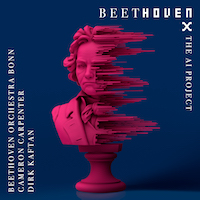Mostly Symphonies 41. / (Dis)Arrangements 14: Beethoven X
|
Grant Chu Covell [March 2022.]
It’s true that no one has asked me for my opinion regarding “Beethoven X: The AI Project,” but one of the perks of my La Folia perch is that I can assemble unsolicited feedback at leisure. Simplistically, the project has brought some new Beethoven bits into circulation, but they only warrant a brief mention. The project also suggests a potential collaboration between cutting edge science and music, a more enduring topic, but based on these results, it’s too early to tell. Setting aside the project’s history and goals (start here: https://modernrecordings.de/beethovenx/ and then try to keep a straight face here: https://www.beethovenx-ai.com/), the immediate question is whether any good music has come to light. The quick verdict is no. There are two movements to digest, a Scherzo and a Rondo. The Scherzo is less egregious than the absurd Rondo. Not everything that Beethoven wrote was inspired, but so much of his late works were. These scraps are nowhere near that level. If you’re disappointed, explore Barry Cooper’s completion of the Tenth’s first movement, then smile at Beethoven’s own completion of some of the material which landed in this Rondo, the Gratulations-Menuett, WoO 3. Finally, study the Diabelli Variations to be reminded of Beethoven’s genius, and you’ll see where this project falls short. I don’t hear much late Beethoven in these completions. I hear a carefree motivic style I would associate with Rossini or Mendelssohn. In fact, I would probably have guessed this came from somewhere later in the 19th century, from someone less gifted in melody or a composer less able to maximize the inherent capabilities of his or her material (a theme I return to constantly, especially in contemporary music). Maybe I am confounding the poorly handled musical material with the meager imitation of Beethoven’s orchestral style. I don’t want to get into a note-by-note analysis, but whether it can be found in Beethoven’s sketch or not, the Brucknerian timpani flourish in the Scherzo was the first “Are you kidding?” moment for me. Cadences, counter melodies, transitions and rhythmic development are all downhill from there. And who decided to add an organ? Sure, Beethoven was inventive, adding chorus to a symphony or combining piano, chorus and orchestra, but the added organ serves no point, textural or functional. There’s a quote that appears in various guises in the slushy press coverage: “We challenged the audience to determine where Beethoven’s phrases ended and where the A.I. extrapolation began. They couldn’t.” (Retrieved from here: https://www.smithsonianmag.com/innovation/how-artificial-intelligence-completed-beethovens-unfinished-10th-symphony-180978753/) This saddens me, and convinces me of something terrible and depressing, that no one out there knows what Beethoven sounds like (many musicians included) and that most listeners rely upon others’ opinions or the rulings of a self-identifying group of experts. If a bunch of specialists couldn’t slam the brakes on this, then what is the point if I’m in the minority who thinks this doesn’t sound anything like Beethoven. As part of what I do for a living, I’ve worked in the space of AI. My humble experience has taught me that beyond the buzzwords and showy promise, successful application of the new technology centers around the source data and the inherent biases used to train the AI. There’s not a lot of material out there yet which explains the nitty gritty of this project. There are some leaps I wonder about: The only sketches we know about are those that exist (which can’t be every sketch Beethoven ever made), the sketches are hard to read and perhaps need to be interpreted (take a look: https://imslp.org/wiki/Sketchbooks_(Beethoven%2C_Ludwig_van)), the sketches have to be made consistent so they can be used by the model as raw ingredients, and other people (not Beethoven) tried to pick results that they thought were most Beethoven-like. All these steps require human involvement and making decisions by people who are not Beethoven. Composing is all about choices: What pitch comes next, what form something takes, what material is rejected. I understand that the project tried to predict Beethoven’s results based on previous choices, but we’re speculating about the end of Beethoven’s career. It might have been better to create an alternate cello sonata movement or a piano Scherzo from the middle period rather than try to imagine a final work. Of course, if the project went down this path it would also have been easier to compare with contemporaneously finished works, and then it may have become obvious that the algorithm’s results were subpar. It’s arrogant to have gone straight for Beethoven’s Tenth. The project’s press has been greeted with a great big yawn. Then again new discoveries have little staying power (there was some Bach in recent years, and before that some Sibelius bits). I think no one cares about new Beethoven. At least, few care enough to be critical. The smartest voice I’ve seen has been Jan Swafford (https://van-magazine.com/mag/jan-swafford-beethoven-x/) who wrapped it up very nicely. If this was a test, then we have failed it, and adequately managed Artificial Intelligence has won this round. I had optimistically believed that more people could tell the difference between Beethoven and Diabelli. Maybe the techniques can be repurposed (to optimize advertising, to influence popular opinion, to spy on other people, or whatever technology is good for these days). Just as rashly that Beethoven gouged out Napoleon’s name on the Eroica’s title page, we can’t begin to guess at Beethoven’s ultimate choices. I don’t mean to say that such a project isn’t worthwhile, but we’re not going to get Beethoven out of it at the first try. Maybe Kuhlau, Hummel or Ries if we are very lucky.
[More
Beethoven]
[Previous Article:
Used Bin Troll Tweets FFF.]
[Next Article:
Used Bin Troll Tweets GGG.]
|
